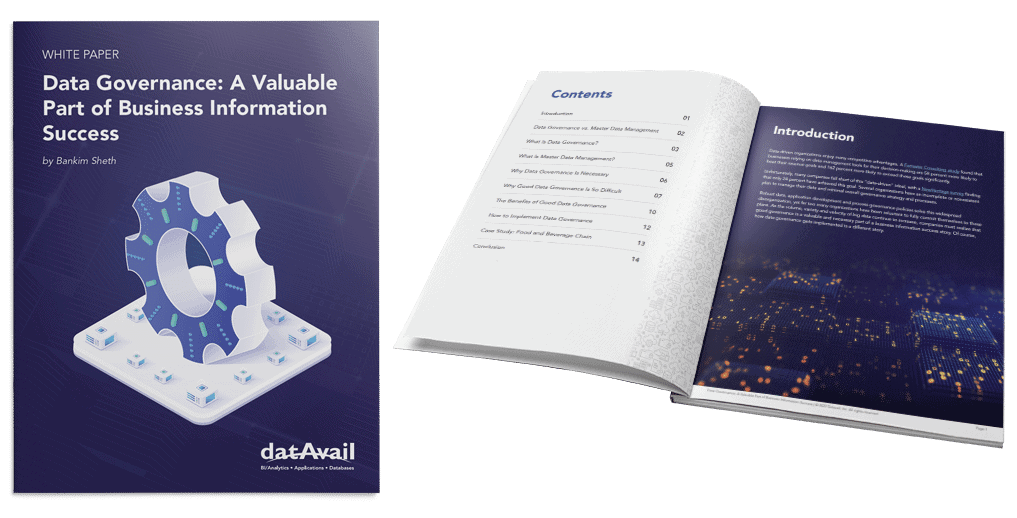Data Governance: A Valuable Part of Business Information Success

Data-driven organizations enjoy many competitive advantages
A Forrester Consulting study found that businesses relying on data management tools for their decision-making are 58 percent more likely to beat their revenue goals and 162 percent more likely to exceed these goals significantly.
Unfortunately, many companies fall short of this “data-driven” ideal, with a NewVantage survey finding that only 24 percent have achieved this goal. Several organizations have an incomplete or nonexistent plan to manage their data and minimal overall governance strategy and processes.
Robust data, application development and process governance policies solve this widespread disorganization, yet far too many organizations have been reluctant to fully commit themselves to these plans. As the volume, variety and velocity of big data continue to increase, companies must realize that good governance is a valuable and necessary part of a business information success story. Of course, how data governance gets implemented is a different story.
Download our paper to learn:
- The Difference Between Data Governance vs. Master Data Management (MDM) – Data governance is closely related to, but not the same as, the concept of “master data management” (MDM).
- What Data Governance is, the Areas it Covers, and How it Helps Organizations – Beyond the broad definition of the management of an organization’s data assets. More formally, it is a system of rights and accountability processes that allow for effective and efficient data-related decisions to be made within an organization.
- What Is Master Data Management? – Master data management (MDM) is more limited than Data Governance, but vital as it seeks to create a single point of reference for all of an enterprise’s business-critical information.
- Why Data Governance Is Necessary – Businesses are eager to start taking advantage of the insights that data can unlock, with 73 percent of IT decision-makers relying on data more than ever, according to Druva. However, many key decision-makers have reservations that prevent them from fully embracing their data.
- Why Good Data Governance Is So Difficult – Harvard Business Review found that only 30 percent of organizations have developed a well-articulated data strategy, while VentureBeat reportsthat 87 percent of data science projects never make it to production.
- The Benefits of Good Data Governance – While implementing a successful data governance program is no easy task, the advantages are many and well worth the effort.
- How to Implement Data Governance – Data is the backbone and asset of every organization and how it’s utilized can be the difference between success and failure. Even if you’re convinced about the urgent need for data governance within your organization, you need to know how to get there. Having a dedicated team of experienced, knowledgeable data management professionals can make a big difference.
- Datavail’s team knows how to take a holistic, non-invasive approach to data governance to align all facets of your organization. This lets you ensure that data assets are of the highest quality and integrity while remaining compliant and adhering to best practices. We’ve helped dozens of clients get a better grip on their enterprise data by implementing strong data governance strategies.
- Many companies don’t feel prepared or equipped to tackle these tasks and strategies on their own; that’s where we come in. At Datavail, we offer data governance services that fit the needs of any company struggling to get a handle on their information. Data governance can make your enterprise information more reliable, consistent and complete when used correctly to further your business goals and objectives.
- Real-Life Case Study: How a Food and Beverage Chain Successfully Implemented Data Governance in their Organization, and Reaped the Benefits – A major food and beverage chain with more than 4,000 employees worked with Datavail to develop and implement a strategic roadmap for its data management processes and technologies.
Download the White Paper